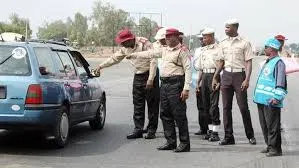Mr Emmanuel Fadero, Unit Commander, Federal Road Safety Corps (FRSC) in Ile-Ife, Osun, has urged motorists to always maintain the approved speed limit, especially during the raining season, to reduce carnage on the highway.
Fadero, an Assistant Corps Commander, gave the advice in an interview with the News Agency of Nigeria (NAN) on Saturday in Ile-Ife.
He said that though FRSC had specific speed limits for respective road users on the highway, he, however, stressed the need for them to apply caution during the raining season.
The FRSC official noted that it was imperative for motorists to reduce their speed due to the prevailing road conditions.
According to him, driving when it is raining comes with a lot of challenges, thus requiring some measure of caution to avert road crashes.
He noted that the unfavourable weather during the rains could hamper visibility, adding, however, that a good driver must endeavour to have visibility ahead of him.
“Some drivers do not see very well when it is raining. Their visibility is not always as accurate as when they are driving during the dry season.
“During this period, potholes are covered with water from the erosion and are usually deeper during the rainy season.
“Potholes that are filled with sand during the dry season will be passable, but as it is raining, the sand will be flushed out, with the possibility of the potholes getting deeper.
“Water may cover the potholes and thus make it dangerous for the driver who is speeding.
“There are even time when branches of trees will fall on the highway and any driver who is not careful can run into such spots,” he said.
Fadero said that FRSC officials had been mandated to regularly check wipers of different categories of vehicles, adding that some vehicles had been apprehended in the process.
“We also have patrol operations on light sign violation (LSV). We check all the lightening systems of vehicles, such as the headlamp, parking light as well as single and double traffic indicators, among others.
“The patrol teams usually ensure that all the light, both static and directional, of all vehicles are functioning properly to provide enough illumination when it is raining.
“Public enlightenment programmes are equally carried out for both drivers and commuters,” he explained.
Fadero warned motorists against reckless driving, urging them to abide by the rules and regulations guiding driving.
He also enjoined road users to be cautious in order not to endanger other people’s lives. (NAN)

